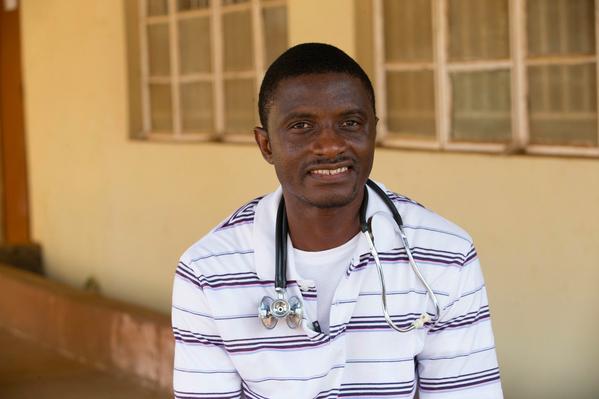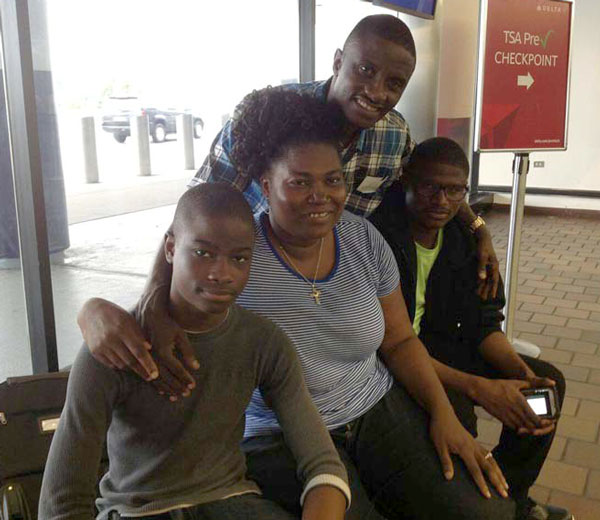17 Nov The Death of Dr. Martin Salia

Dr. Martin Salia
Steve Dennie, Director of Communications
Dr. Martin Salia passed away shortly before 4 am Monday morning, November 17. He had been diagnosed with Ebola on November 10. An air ambulance flew him to the United States on Friday night, November 14. He arrived Saturday afternoon at the Nebraska Medical Center, one of four US facilities equipped to handle highly infectious and dangerous diseases.
Heroic Measures to Save Dr. Salia’s Life
When he arrived, Dr. Salia was already in critical condition, with no kidney function and respiratory failure. Within 12 hours, he was in complete respiratory failure. Dr. Phil Smith, medical director of the Nebraska biocontainiment unit, said, “We used every possible treatment available to give Dr. Salia every possible opportunity for survival.”
That included continual dialysis, a ventilator, blood plasma from Ebola survivors, and various drugs, including ZMapp, the drug used on Dr. Kent Brantley and other Ebola survivors.
Smith continued, “As we have learned, early treatment with these patients is essential. In Dr. Salia’s case, his disease was already extremely advanced by the time he came here for treatment.”
Salia arrived on what was determined to be day 13 of his illness (people don’t show symptoms right away). The two previous Ebola patients treated at the Nebraska Medical Center, both of whom survived, arrived on days 6 and 8.
Dr. Salia was chief medical officer and surgeon at the 60-bed Kissy United Methodist Hospital in Freetown, and also helped at several other medical facilities. It’s not known where he contracted the disease.
His body will be cremated. An autopsy is too dangerous, since the bodies of Ebola victims are extremely contagious.
Statement from Jeff Bleijerveld
Sierra Leone Conference funded the medical training of Dr. Salia, sending him to Burkina Faso to a school which specialized in training missionary doctors. In recent years, Dr. Salia was involved as a consultant and occasional visiting physician at Mattru Hospital, the United Brethren hospital in Sierra Leone.
Rev. Jeff Bleijerveld, who knew Dr. Salia through his role as Director of Global Ministries for United Brethren churches in the US and Canada, issued this statement:
“I am saddened by the death of Dr. Martin Salia. This highly skilled surgeon served his countrymen selflessly and with a strong Christian witness. In addition to his employment at Kissy Hospital in Freetown, Dr. Salia graciously volunteered his services to our hospital in Mattru, Sierra Leone. People across the United Brethren in Christ denomination, in 18 countries, will be remembering Mrs. Salia and their two sons in prayer.”

Dr. Salia with his wife and two sons.
The Salia Family
Dr. Salia leaves behind a wife and two sons, ages 20 and 12, who live in New Carrollton, Md. According to Dr. Richard Toupin, a former doctor at Mattru, Mrs. Salia came to the States in 2003 and later became a US citizen.
Mrs. Salia traveled to the Nebraska Medical Center, and was able to view her husband through a video connection. In a statement released through the medical center, she said, “In the short time we spent here, it was apparent how caring and compassionate everyone was. We are so appreciative of the opportunity for my husband to be treated here and believe he was in the best place possible.”
The Days Leading Up to the Evacuation
The Washington Post did some excellent reporting about what happened in Sierra Leone regarding Dr. Salia’s early diagnosis.
When Dr. Salia began feeling ill, the Post article said, he was taken to the 120-bed Hastings Ebola Treatment Center (a converted police training base) in the Freetown area. An Ebola test conducted by a team of Chinese lab workers yielded a negative diagnosis. Coworkers rejoiced and embraced Dr. Salia.
However, Ebola tests taken during the first three days of the illness tend to be inconclusive, because the bloodstream doesn’t yet have enough of the disease to be detected.
When Dr. Salia’s symptoms persisted—high fever, vomiting, diarrhea, fatigue–he told a coworker that, despite the negative diagnosis, he thought he had Ebola.
A second test was done on November 10, this time by a South African team at Lakka Hospital in Freetown. That test confirmed that he had Ebola.
A group of American doctors who came to the Hastings center, along with the US State department, were involved in facilitating Dr. Salia’s eventual evacuation. Mrs. Salia, a US citizen, agreed to cover the costs.
The article said Dr. Salia seemed to be constantly working, and quoted the United Methodist Bishop in Sierra Leone, John K. Yambasu, as saying, “His hobby was surgery.”
Dr. Salia told fellow doctors that he didn’t know where exactly he contracted Ebola. The Kissy hospital itself didn’t work with Ebola patients. However, Salia served at several other medical facilities.
Three of Dr. Salia’s colleagues at Kissy United Methodist Hospital are under quarantine in the surgery ward where Dr. Salia treated patients.
The Washington Post reports that since the Ebola crisis began, the disease has claimed the lives of 320 Sierra Leonean medical workers. Dr. Salia was the sixth Sierra Leonean surgeon to be stricken with Ebola. All six have died.
Contributing Toward the Costs
Mrs. Isatu Salia, 40, told the Methodist Church news service that she would pay the $200,000 cost of bringing her husband to the US.
Are you interested in contributing toward those expenses? If so, Jeff Bleijerveld, director of Global Ministries, suggests that you gives through the United Methodist Church, which employed Dr. Salia in Sierra Leone.
The Great Plains United Methodist District, which covers the states of Kansas and Nebraska, has established a “Dr. Martin and Isatu Salia Fund” to help offset the costs of medical, transportation, and other expenses related to Dr. Salia’s Ebola treatment.

No Comments